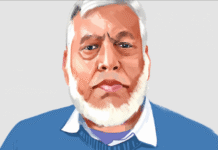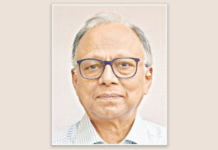Prothom Alo

From the very outset, BNP has been crossing swords with the interim government over various issues. The advisors of the interim government too have made it clear in various ways that they are not too pleased with BNP’s political stance. Whenever BNP demands the elections to be held soon, the student leaders insist that there will be no elections before reforms.
Reforms and the election are not contradictory. Even so, there are many who are projecting these as contradictory. The tension between the interim government and BNP over the past few months over the election schedule has been palpable. The meetings between the interim government and the political parties over the issue of reforms have hardly given any message of hope either. Everyone remains adamant in their respective positions.
The National Citizen Party (NCP), formed from the students’ leadership, speaks of a new settlement, their politics remain on the same old track of existing political strategies and ways. NCP maintains that the elections must come after the trials and reforms. BNP maintains that reforms required for a free and fair election should be carried out, nothing more.
Despite strong pressure from BNP, Chief Advisor Muhammad Yunus is not coming up with a specific date for the election. Many may argue that it is the commission that is to announce the election date. But when the commission was preparing for the elections with December in mind, the chief advisor stuck to his guns in his address to the nation on the occasion of Independence Day. He repeated that the election would be held anytime between December this year and June next year.
Previously it had been said that if the political parties wanted less reforms, then the election would be held in December, and if they wanted more reforms then it could be held in June next year. Then again, some within the government mentioned the elections would be held in December or March. When will the government break free of the December, March, June vortex?
Nahid Islam’s National Citizen Party (NCP) would be BNP’s main contender in the next election. The student leaders have expressed their aspirations for a new change from the new old parties of Bangladesh
The BNP leaders have expressed their suspicions concerning the interim government’s motives too. That is because some elements have started talking anew about forming a national government. A leader of NCP has expressed the wish to see Muhammad Yunus as prime minister for five years. He would have to be elected to be the prime minister.
After the fall of the Awami League government on 5 August, the student leaders had proposed the formation of a national government comprising representatives of different political parties. BNP did not acquiesce. And so the other parties had to back away from that too and then a non-political interim government under Muhammad Yunus was formed. That was a correct move. But when three student representatives of the movement were inducted in the council of advisors, the non-political government gained political colour.
This too was a major bone of contention between BNP and the interim government. Secondly, there are also several factions among the student leadership that led the July uprising. Some have formed the party, some remain steadfast in their previous stance, some have formed cultural a platform. Then there is another group who has announced they will form a new party outside of NCP.
In such a backdrop, BNP secretary general addressed a press briefing on Sunday, the day before Eid, asking for those advisors who are rendering the interim government controversial, to be dropped. He said, “Chief Advisor Professor Muhammad Yunus should drop those advisors who are harming the neutrality of the interim government and rendering it controversial.”
Mirza Fakhrul did not name any particular advisor, but cautioned, “BNP will not accept it if the government loses its neutrality before the forthcoming election. We expect the government’s total neutrality, particularly from Professor Yunus. If he feels that anyone in his cabinet (council of advisors) is harming its neutrality, he should remove them. He must remain absolutely transparent. If the chief advisor does not speedily take effective measures in this connection, then the people will perceive that this government has failed to maintain neutrality.”
A hint is enough for the wise, it is said. They surely have understood whom the BNP secretary general was pinpointing. In his words, “If certain advisors of the government use government resources in the interests of a particular political party, that will certainly damage the government neutrality.”
During the rule of the political government, allocations would be made in the name of party leaders or projects would be taken up the moment the election campaigning began. But the interim government is not supposed to have any political ambitions. Even so allocations are being made on special consideration. Therein lies Mirza Fakhrul Islam Alamgir’s objection.
Meanwhile, BNP standing committee member Abdul Moyeen Khan, presently visiting the United States, told Reuters in an interview that instability would arise in the country if the election was not held by December and a sense of anger would grow among the people. He said that the December schedule was acceptable to all. If the election date was stalled further, the situation would grow complex. A strong sense of anger would brew among the people of Bangladesh.
Reuters said that with Sheikh Hasina and the senior leaders of her party having fled, Awami League was more or less defunct. In that sense, Nahid Islam’s National Citizen Party (NCP) would be BNP’s main contender in the next election. The student leaders have expressed their aspirations for a new change from the new old parties of Bangladesh.
While exchanging Eid greetings with party leaders and activists, BNP standing committee member Amir Khasru Mahmud Chowdhury went ahead a little further, saying that a certain force was conjuring up new ways and means to stay in power. But the fascists could not last and the people of Bangladesh are ready to ensure that this force will not be able to rise up either.
From the statements of these three senior leaders it is apparent that BNP is adamant not to step back from their demand for the election to be held in December. Many leaders have even indicated that they would take up a movement before that to restore democratic rights.
The media has also reported on differences within the council of advisors regarding the election. One part feels that it is their responsibility to hold a free and fair election within a justified time and then step down. But another section feels that if there is an election without reforms, there will be a return of autocracy. Such a massive mass uprising wasn’t held just for an election. BNP feels they are echoing the words of the NCP leaders.
Does that mean we are heading to another stalemate?
* Sohrab Hassan is joint editor of Prothom Alo and a poet
* This column appeared in the print and online edition of Prothom Alo and has been rewritten for the English edition by Ayesha Kabir









